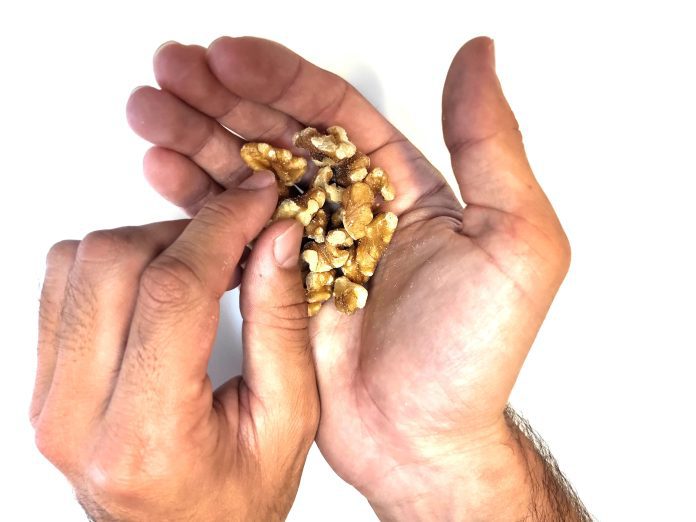Through nearly two decades of supporting walnut nutrition research, California Walnut Commission (CWC) has helped reposition walnuts in consumers’ minds as a good-for-you food and has made walnuts known across the globe for their many health benefits, which hasn’t always been the case. Walnuts once had low visibility as a healthful option, which CWC set out to change through support of scientific research on how the consumption of walnuts affects human health.
This research has uncovered many important and exciting findings about the effects of walnut consumption on heart health, cognition, cancer, diabetes, metabolic syndrome, gut health, body weight/composition, reproductive health and more. As research deepened walnuts’ association with nutrition and consumer health, in late 2022, the FDA released an updated proposed definition of the term “healthy,” with walnuts meeting the proposed definition for the first time.
As Health Research Director for CWC, Carol Sloan, R.D. played a key role in advancing health research on behalf of walnuts. Since her work at CWC began in 2000, Sloan not only helped implement and oversee active research studies internationally and domestically, she synthesized the scientific data for marketing programs and global consumer audiences, highlighted data findings for key stakeholders and health professionals, and relayed findings to the key personnel who influence public policy. Research showing the many benefits of walnuts has been beneficial in supporting recommendations for walnut consumption in the U.S. Dietary Guidelines for Americans as well as providing evidence for including walnuts in the new FDA proposed definition of “healthy.”
In late 2022, Sloan capped her tenure with CWC by announcing her retirement.
“When people think of walnuts today, they think of a healthy nut and omega-3 ALA, but that hasn’t always been the case. The nutrition research that Carol has heralded over the last two decades has been a valuable tool in getting walnuts in more homes around the world,” said Robert Verloop, president of CWC. “Published research that shows the multitude of walnuts’ health benefits gives CWC the proof points to show that we don’t just belong in the baking aisle; walnuts are also right at home alongside the fresh fruits and vegetables in the produce section. We could not have started this journey without Carol’s contributions, and we wish her all the best in her retirement.”
Sloan was particularly pleased to close out her CWC tenure with the results of three new research papers that demonstrate even more benefits of walnuts in key areas. Overall, these studies reinforce the value that walnuts provide when included in the diet. Consistently, research supports the idea that walnuts help people form good nutrition and lifestyle habits while also supporting overall wellbeing. Research like this is increasingly more important as the process moves forward for the 2025-30 Dietary Guidelines for Americans, which include mental health and stress reduction, improving diet quality and heart health.
Mental Health and Stress Reduction
A new study published in Nutrients suggests walnuts may help fend off academic stress among undergraduate university students, a group commonly strained by the pressures of college life. Researchers at the University of South Australia compared two groups of undergraduate university students: One group that ate walnuts and a group that did not. The study concluded those who ate two ounces of walnuts a day for 16 weeks improved self-reported mental health indictors, had a protective effect against some of the negative impacts of academic stress, and aided self-reported sleep quality in the longer term.1
Improving Diet Quality
A new modeling study, also published in Nutrients, found that adding one ounce of walnuts (or one handful) to the diet of children and adults who do not normally eat nuts improved the overall diet quality and intake of under-consumed nutrients of public health importance like fiber, potassium and magnesium. These new findings carry forward previous results that suggest walnuts may act as a bridge to better wellbeing.2
Heart Health
A study from researchers from the University of Minnesota School of Public Health found that walnuts act like a bridge to other positive impacts on health, including better-quality diet, being more physically active and having a better heart disease risk profile. The study, published in Nutrition, Metabolism & Cardiovascular Diseases, looked at 20 years of diet history and 30 years of clinical and physical measurements and suggests reinforcing heart-healthy habits is as simple as…a handful of walnuts!3
References
Herselman MF, et al. The effects of walnuts and academic stress on mental health, general well-being and the gut microbiota in a sample of university students: A randomised clinical trial. Nutrients. 2022;14:4776.
Yi SY, et al. Association of nut consumption with CVD risk factors in young to middle-aged adults: The Coronary Artery Risk Development in Young Adults (CARDIA) study. Nutrition, Metabolism and Cardiovascular Diseases. 2022;32(10):2321-2329.
Spence LA, Henschel B, Li R, Tekwe CD, Thiagarajah K. Adding walnuts to the usual diet can improve diet quality in the United States: Diet modeling study based on NHANES 2015–2018. Nutrients. 2023; 15(2):258.
















